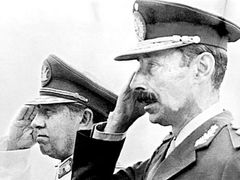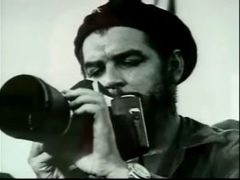Film tip - At the end of November last year, Simon Wiesenthal Centre started off the last big chase after Nazi criminals hiding in South America, where many of them still live secretly.
But not Klaus Barbie, who was arrested in Bolivia in 1983 and sentenced to life in prison four years later. Unlike many others, Barbie didn´t manage to escape from public life so successfully.
One World film festival now presents a magnificient documentary film My Enemy´s Enemy by Kevin MacDonald, which maps the whole Barbie´s life journey. Czech viewers know Kevin MacDonald rather well, as they had a chance to his feature film - portrait of the Uganda dictator Idi Amin, The Last King of Scotland, or the Andean drama of two climbers, Touching the Void in Czech cinemas.
The feature documentary examines Barbie´s life from the times of the Lyon Gestapo, over the collaboration with the USA after the War, to his other career rise in Bolivia, until his death from cancer in prison in 1991.
A Nazi working for USA
Like many others, right after the capitulation of Germany, Barbie started to collaborate with the United States, which offered him protection within "the fight against communism".
Barbie had also contacts with traitors from the French Resistance, including some high-profiled people who had no interest in the deeds of "The Butcher of Lyon" being publicly discussed.
However, his real rise came after having moved to Bolivia, where this devoted Nazi, using pseudonym Klaus Altmann, paradoxically started to work with Indians and also with Jewish ranchers.
Nevertheless, he was able to leave this "menial" job, when his bootlicking the local military officers started to bear fruit.
CIA connection
Barbie became a co-owner of a Bolivian marine company, Transmaritima Boliviana, and a connection between CIA and a military dictator René Barrientos (in power from 1964 until 1968). It is said, that he was even behind the plan that helped CIA and Barrientos´s troups capture the Argentinian revolutionary Ernesto "Che" Guevara in 1967.
After the general Hugo Banzer´s coup four years later, he became an advisor of the Bolivian Security Service at interrogations of "communists", e.g. teachers, trade unionists and humanitarian workers.
However, his career shone brightest in 1980. At that time, it seemed that a civil government would come to power, which wasn´t to liking of the wealthiest Bolivian citizen and cocaine dealer, Roberto Suárez.
Fiances of Death
Therefore, Suárez decided to etablish order in the country, which meant a coup, and to do that, he needed some tough men. So he called up Barbie, who didn´t really trust "latinos" in this matter.
Therefore Suárez contacted a group of some other former Nazis, who had proved to be worthy to Suárez earlier in his fight against the Columbians.
The paramilitary group was called stylishly "Fiances of Death" and their coup was carried out stylishly as well. Barbie ensured the delivery of Austrian tanks Steyr and also, that this putsch was the bloodiest of those 189 putsches, which have ocurred in the history of Bolivia. Just within the first two weeks, 500 trade unionists were shot down.
The general Gabriel García Meza became the head of the junta (for a 1.3-million-dollar deposit and a promised later payment). However, the rule of cocaine bosses lasted only one year in the country and its fall also brought the fall of Barbie.
He was captured and without any great fuss, put on a plane to France, where he was arrested.
And what about our crimes?
MacDonald´s movie maps Barbie´s career matter-of-factly and without exaggerated emotions. To achieve that, he uses archive interviews with historians, soldiers, politicians and also Barbie´s victims, opponents, collaborators and members of his family.
One of the strongest moments of the movie occurs right at the beginning, when Barbie´s daughter is protesting against the use of the expression the butcher of Lyon: "Butchers complain about that, it is just a common profession, after all".
Another climax arrived when Barbie/Altmann travels as a representative of Transmaritima to Paris and, in Pantheon, he puts flowers on the grave of the leader of the French Resistance Jean Moulin a man, tortured by Barbie himself.
Meanwhile, director Kevin MacDonald is asking, together with Barbie´s defender Jacques Vergs: Do we have the right to judge a man, only because he was fighting on the wrong side? What about our crimes in Algiers, Vietnam and Latin America?
And this question remains unanswered.
Screenings at the One World Festival:
12.03.2008 / 19:30 / Světozor cinema venue






